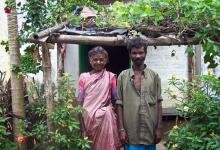How do you turn a slum into modern condominium homes for the former slum dwellers? Find out how this social entrepreneur did it.

Dr. Darin Gunesekera believes that with home ownership comes wealth and the end of criminal activity.
Yale graduate Dr. Darin Gunesekera’s unassuming manner belies his standing at home and in the international community. He is, after all, the man who transformed a slum in Colombo, Sri Lanka, into a condominium complex housing 4,000, a feat which won him international acclaim.
“People were against it at first. Banks were only interested in giving loans, not in having the system changed, and developers thought slum dwellers could not be trusted so it was a struggle to get things going,“ said Gunesekera.
To get over the obstacles, he created, in effect, a property stock exchange market which offered squatters a home which they could legally call their own and the landowner a way to derive value from the land the squatters had occupied until then. Under his scheme, the inner city slum and shanty dwellers could trade their main item of ‘wealth’, the land they had lived on illegally.
Dr. Gunesekera was elected by the Ashoka foundation as the first fellow from Sri Lanka in 2003 for this achievement. The Ashoka foundation has been at the forefront of social entrepreneurship since 1981. In 2009, the UN agency for human settlement UN-HABITAT presented Dr. Gunesekera with the Good Practice Award.
In an interview with theasiamag, he showed his grasp of the complexities of the economies of India and Sri Lanka. In his opinion, the Academy award-winning film “Slum Dog Millionaire” depicted a Westerner’s idea of slum dwellers: that they are ill-educated and impoverished outcasts.
“Slum dwellers in Colombo, for example, are often new graduates who cannot afford to buy property on their meagre salaries. They end up as squatters,” he said.
“They are in fact upwardly mobile and all they need is a chance to own a home,” he explained, pointing out that largely Buddhist Sri Lanka does not subscribe to the caste system and so avoids the ghettos the system creates.
Determined to solve the squatter problem, Dr. Gunesekera, working with others, including his future wife, moved the entire population of the slum - drug dealers and all - into the condominium. He explained that with home ownership came wealth and the end of criminal activity.
And this was proven when the 4,000 became property owners and the condominium remained crime-free.
According to the Ashoka website, Dr. Gunesekera started by persuading the government and other development organizations to play a new role. He trained welfare officers to become marketing personnel who promoted his idea to the poor. He then sold their real estate and bought them new, modern apartments of their choice.
The government’s role then changed to that of monitoring a market economy: ensuring transparency and regulating new development plans for neighbourhoods inclusive of the poor, approving the establishment of land and real estate trusts, and registering ownership titles to homes.
The programme created for slum dwellers a transferable asset in the land they occupied which they transferred to a trust. In exchange, they received entitlement certificates to purchase an apartment in a new building. These certificates were a vote for the building of their choice.
The plan gives the poor the same sense of economic choice as the middle class.
They were redeemed for a title to a condominium apartment in the new building. They now also own a share of the common areas that may include shops, a preschool, and more. And so they become stakeholders in urban regeneration.
The stock exchange market has changed the practices of developers who found they now had to compete for the preference of the poor. They have to compete openly, using models and advertising in a transparent bidding process of development proposals. Banks are also encouraged to change old practices.
The plan gives the poor the same sense of economic choice as the middle class. Further, the resulting housing provides the same environment as that of the middle class. This process of inclusion helps integrate society.
This scheme, called a Social Real Estate Investment Trust system, and Dr Gunesekera are supported by the Wiros Lokh Institute Trust (Sri Lanka), Capital for the Marginalized Limited (Singapore), and Capital Markets for the Marginalized Inc, USA which are independent charities.
Related Story:
A Man's Quest for Culinary Truths
FOLLOW US

STAFF BLOGS
Chilli Padi
VIVIENNE KHOO
Couch Potato
ASIA!NS
Field Notes
DEBBY NG
From Jerusalem to the West Bank
DAN-CHYI CHUA
Words and Letters
CLARISSA TAN












